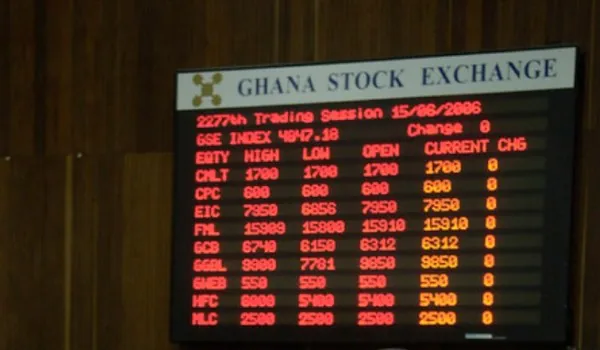The Ghana Stock Exchange closed Friday’s trading session with impressive gains as financial stocks drove the market higher, capping a week that saw over GH¢26 million in turnover and reinforced the bourse’s position among Africa’s best performing markets this year.
Friday’s session marked the 7,073rd trading day in GSE history, with the benchmark Composite Index adding 6.18 points to close at 8,495.93 points. But the real story emerged in the Financial Stocks Index, which surged 43.29 points to reach 4,063.62, significantly outpacing the broader market and signaling continued investor appetite for banking sector equities.
The divergence between the two indices tells an interesting story about where smart money is flowing. While the main index posted modest gains of less than one percent, financial stocks jumped more than one percent in a single session, suggesting that investors see value concentrations in Ghana’s banking and insurance sectors that aren’t evenly distributed across other listed companies.
Friday’s trading volume reached 2,288,487 shares worth GH¢8.29 million, more than double the previous day’s activity. This represented the highest turnover of the week and brought total weekly trading value to approximately GH¢25.79 million across five sessions. Such concentrated Friday activity often indicates institutional investors positioning themselves before the weekend, though it also reflects ongoing patterns where a handful of large trades dominate daily statistics.
Market capitalization climbed to GH¢168.08 billion at the close, up from GH¢167.18 billion on Thursday. That GH¢900 million single day increase in total market value demonstrates how quickly paper wealth can accumulate when investor sentiment turns positive, particularly in a market where relatively modest order flows can move prices significantly.
The week’s trading pattern revealed the characteristic rhythms that have defined the GSE throughout 2025. Monday opened with moderate activity at 1.21 million shares traded for GH¢2.65 million. Tuesday saw both volume and value increase, with 1.28 million shares changing hands for GH¢5.69 million. Wednesday brought slightly lower volume at 976,196 shares, though turnover actually improved to GH¢6.03 million, indicating investors were targeting more expensive stocks.
Thursday marked the week’s quietest session, with just 898,646 shares traded for GH¢3.13 million before Friday’s surge restored momentum. These fluctuations aren’t unusual for the GSE, where daily volumes can swing dramatically based on whether large institutional investors decide to participate actively or sit on the sidelines.
Year to date performance continues to impress by any standard. The GSE Composite Index has gained 73.79 percent since January 1, 2025, while the Financial Stocks Index shows an even stronger 70.68 percent return over the same period. These numbers place Ghana’s equity market among the top performers globally, though questions persist about whether such gains can be sustained as the year draws to a close.
The financial sector’s outperformance deserves closer examination. Banking stocks have benefited from several factors in 2025, including improved asset quality following years of cleanup, stronger profitability as interest rates normalize, and investor perceptions that the sector offers relative stability compared to commodity linked securities that remain vulnerable to international price swings.
Recent weeks have seen gold related investments underperform as global commodity prices shifted, making the defensive characteristics of financial stocks more attractive. When external factors create uncertainty, investors often rotate toward domestic focused sectors like banking where earnings depend more on local economic conditions than volatile international markets.
However, the concentration of trading activity remains a persistent challenge for market development. On any given day, the vast majority of listed companies record zero trading volume, with activity concentrated in perhaps five to ten actively traded counters. This thin liquidity creates both opportunities and risks for investors.
Price movements can be amplified by relatively small order flows, creating potential for quick gains but also vulnerability to sharp reversals if sentiment shifts. For investors seeking to build or exit positions of any significant size, the limited liquidity in many stocks makes strategic execution difficult without moving prices unfavorably.
The Ghana Alternative Market, designed specifically for smaller and emerging companies, continues to show minimal activity. While the platform theoretically offers growth companies an easier listing route than the main board, trading remains largely dormant, limiting its utility for both issuers seeking capital and investors seeking opportunities.
Market observers note that Friday’s strong finish provides positive momentum heading into the following week. Technical traders often watch for such patterns, believing that strong closes can influence Monday’s opening sentiment. Whether that theory holds depends largely on what happens over the weekend and whether any significant news emerges before markets reopen.
The GSE’s year to date performance has certainly exceeded most analysts’ expectations at the start of 2025. What began as cautious optimism following macroeconomic challenges in prior years has evolved into genuine enthusiasm as corporate earnings improved, inflation moderated, and investor confidence returned.
Yet sustainability remains the key question. Can the market maintain momentum through year end and into 2026, or will profit taking eventually slow the rally? Financial stocks have led the charge, but broadening participation across more sectors and individual securities would provide more robust evidence of sustainable market health.
For now, Friday’s session offered investors another positive data point: strong volume, solid index gains, and continued financial sector outperformance. The GH¢168 billion market capitalization represents real wealth for pension funds, institutional investors, and individuals who’ve participated in the rally.
Whether Ghana’s equity market can continue attracting both domestic and international capital depends partly on factors beyond the exchange itself. Economic growth prospects, regulatory frameworks, corporate governance standards, and political stability all influence investor willingness to commit capital. Friday’s trading suggests that for now, the combination looks attractive enough to keep money flowing into Ghanaian equities.
Source: newsghana.com.gh











